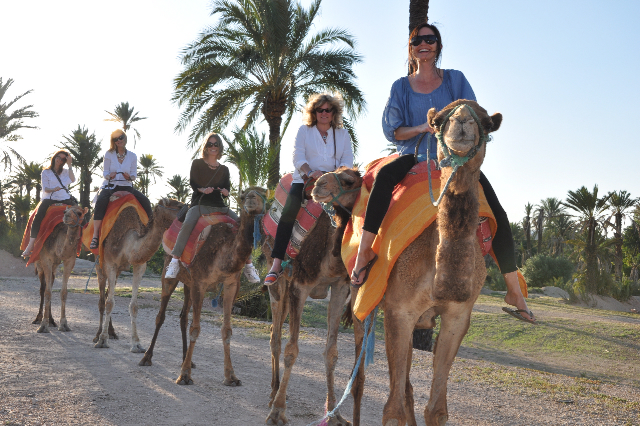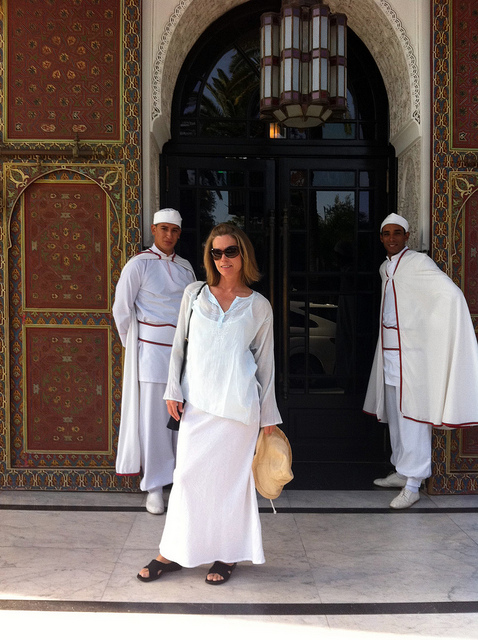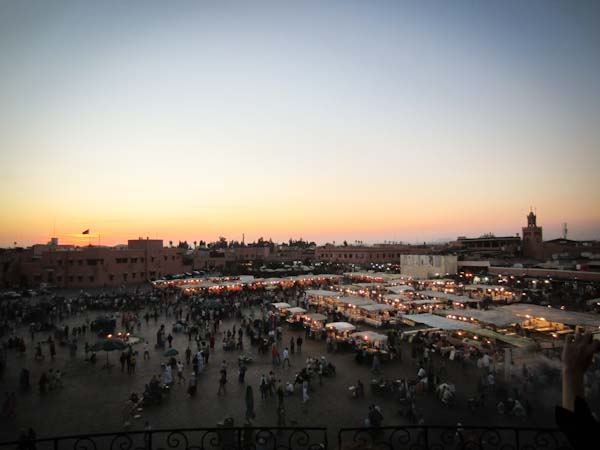It is the master of the house (or, in his absence, his wife or a wordless lalla will assume the task) who patiently, religiously and with remarkable seriousness prepares tea before you very eyes. While every other dish and platter is lovingly cooked away from praying eyes, tea is keen to be seen. If you made tea in the kitchen, this would be disobeying the rules of hospitality.
Chitika
Wednesday 15 June 2011
Colourful Marrakech
Anyone who's been to Morocco Marrakesh
Liverpool FC to make move for Morocco playmaker Adil Taarabt
QPR playmaker Adel Taarabt, who has been linked with a move to Liverpool, is reportedly a transfer target for Real Madrid
The 21-year-old has been a key player for Queens Park Rangers this season with his 19 goals helping the London club to secure promotion to the Premier League.
Liverpool have been keen on the Morocco international for some time, but according to Metro, Spanish giants Real Madrid are also showing interest.
Taarabt has allegedly told team-mates of the interest in him from the Spanish capital and although Real are set for a busy summer in the transfer market as they look to rebuild following Tuesday night's Champions League exit at the hands of rivals Barcelona, whether Los Blancos coach Jose Mourinho makes a bid to sign the former Lens player remains to be seen.
Liverpool's director of football Damien Comolli is responsible for bringing the highly-rated youngster to England and was involved in his move from Lens to Tottenham in 2007.
Should Liverpool reach a deal with QPR then Spurs are also set to cash in as they are believed to have included a sell-on clause when they sold Taarabt to QPR last summer.
Visiting Morocco in the middle the Arab Uprise
Read Jennifer Evans story written by her..
They told us not to go.
Not to Morocco
With uprisings in the Middle East and North Africa, Morocco
"Morocco is different," they assured us at DAI Travel and Austin Lehman Adventures, who both designed fantastic custom tours for us, insisting that Moroccans are peace-loving people. But things were heating up.
Four weeks before we left, a café in Marrakech's busy Djemaa el-Fna was bombed, killing 16 people. Days later, Osama bin Laden was killed by Navy SEALS. Really? we joked. They had 10 years to find him, but they had to do it right before our trip?
Resisting the temptation to chicken out, we opted for an abbreviated (three-day) trip to Marrakech via Paris
Air France took us as far as Paris Paris
Marrakech has been booming for years, and there are scores of hotels and riads to choose from, but I only wanted to stay in one place: La Mamounia, the mythical 1920s luxury hotel where Winston Churchill, Franklin Roosevelt and celebrities, such as the Rolling Stones stayed decades before us. From this recently renovated fairytale venue, surrounded by 17 acres of gardens, we could explore the gritty souks and take a day trip to the High Atlas Mountains, yet still return to the lap of luxury, where a hamam and a fabulous meal awaited. It's perfect for those who want to experience Marrakech, but prefer a protected experience.
When we arrived, six gorgeous doormen in traditional garb swept open the palatial doors with broad smiles; then we were ushered to a seating area in the exquisite lobby, where fresh dates and almond milk scented with orange blossoms awaited, the traditional Moroccan welcome. Our suite, filled with fresh fruit and local sweets, was extravagant -- two sitting rooms, a bedroom, two bathrooms, a walk-in closet and two dressing areas. What more could we want?
Our first stop was -- what else -- a camel ride in the Palmeraie near the outskirts of Marrakech. Our guide Khadija and driver Abdul tried to keep straight faces as we hoisted ourselves upon five one-humped dromedaries like the tourists we were. "Hold on tight," they warned, as my camel lurched to his feet, pitching me forward. I clung to the metal "reins," wondering how bad of an idea this was. I glanced at Arianne, who was holding on for dear life, and we cracked up, mostly from anxiety, but also aware of how ridiculous we were. "Whose idea was this?" we laughed, thankful that the Sahara was too far away for that overnight trek we'd considered.
We dove into the throng of the Jemaa el-Fna Square, our lives passing before us as we dodged donkeys, motorcycles and carriages on the "pedestrian" square. Our senses stirred with the exotic scents, sights and sounds of snake charmers, "water men" and storytellers, along with locals selling everything from aphrodisiacs to orange juice. A toothless old man threw a monkey onto Pilar's shoulder, and she and Lorraine
The sight of the bombed Argana Cafe was unnerving, especially when we climbed the stairs of an identical café across the square to take in the view of the Katoubia minaret, now pink in the setting sun. But we'd chosen faith over fear, so I closed my eyes and listened to the hauntingly beautiful call to prayer.
That night we dined on cinnamon scented b'stilla and fragrant chicken tagine in the lush gardens of Le Marocain, pretending not to notice the armed guards who roamed the lavish property with bomb sniffing dogs.
After a heavenly night in our suite, we headed to Yves Saint Laurent's lush walled Jardin Marjorelle, followed by a tour of the 19th century Bahia Palace
A day trip to the Berber villages of the High Atlas Mountains was the perfect anecdote to shopping, with a picturesque lunch at Domaine de La Roseraie, a resort engulfed in thousands of garden roses overlooking the valley. Too tired to make rational decisions, we ordered cheese soufflés and French onion soup, and got what we deserved: bland food, but for the insanely delicious Moroccan black olives and bread. En route back to Marrakech, we met an elderly Berber woman decked out in a colorful mix of Western clothes, her beautiful smile reminding us that serenity costs nothing.
At Le Tobsil, a four-star riad restaurant set inside a labyrinth of ancient walls, candle-lit tables strewn with rose petals and the mesmerizing sound of Gnaoua musicians set the mood as we were served course after course of traditional food and wine.
Our eyes were full as we said goodbye to Khadija and Abdul who, by now, had become more than just guides, but friends. In Moroccan style, we shook hands and touched our hearts. In American style, we hugged them close.
I often joke that as a child, I was raised on a steady diet of fear. For me, traveling to an exotic destination despite recent world events is facing fear head on.
Why go to Morocco
Now ... where shall we not go next?
Tuesday 14 June 2011
Solution 30 closes in Tunisia and opens in Morocco.
Solution 30 closes in Tunisia and opens in Morocco
Source: boursier.com.
Source: boursier.com.
In an interview published on the site: www.boursier.com, Gianbeppi Fortis, CEO of Call Center “Solutions 30” confirmed the closure of this company in Tunisia and its relocation in Morocco
"We suffered a lot in the first quarter because of problems in Tunisia
We took the decision to close the call center in Tunisia and opened a centre in Morocco
Moroccan firm aims for $13 mln amid Arab IPO drought
Stroc Industrie will offer investors in the Casablanca
The new shares will represent 23 percent of the company's capital after the IPO. Stroc will make its trading debut on July 1 at the latest.
"Stroc's listing price offers a PE of 14.2 times 2011 earnings which is below the Casablanca
Stroc Industrie, which specialises in the construction of industrial units, wants to use IPO proceeds to expand its activities.
In addition to a sharp drop in traded volumes, the Casablanca bourse has lost close to 10 percent of its capitalisation since Zine al-Abidine Ben Ali of Tunisia became the first leader to be toppled by the so-called Arab spring.
The value of IPOs in the Middle East plunged 95 percent to $21.7 million, their lowest level in five years during the first quarter, Ernst & Young said in a recent report, and show little signs of a turnaround in the near future.
The shockwaves of those revolts, that later affected Egypt , Yemen and Syria , stretched to Morocco
King Mohammed promised in March constitutional reform that should trim his powers in favour of the elected government. The monarch is expected to vet the draft reform before it is submitted to a referendum next month.
Monday 13 June 2011
Morocco’s obsession about high scale tourism investment
While many countries try to promote their tourism by simple procedures like printing different sceneries from their tourist attractions in postal stamps like Spanish smart stamps or in their currency notes, the issue has been raised of Morocco’s mass tourism areas, such as resorts like Agadir, many of which were built with World Bank funding during the 1970s, and the potential difficulty of ‘greening’ them. And, as reported on Green Prophet earlier this month, Morocco
Subscribe to:
Posts (Atom)













